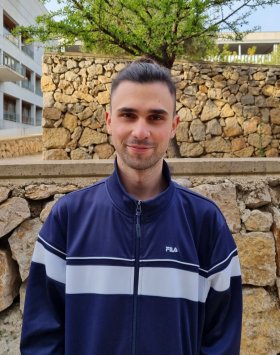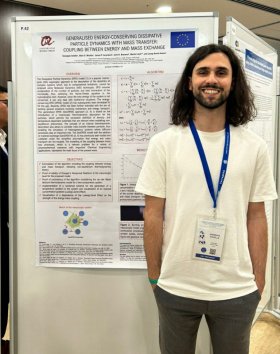Giuseppe Colella


PhD Programme: Nanoscience, Materials and Chemical Engineering
Research group: Molecular Simulation
Supervisors: Josep Bonet Avalos & Allan D. Mackie Walker
Bio
Giuseppe holds a Bachelor's Degree in Aerospace Engineering and a Master's Degree in Aerogasdynamics, both obtained at Politecnico di Torino in 2018 and 2021 respectively. During his academic career, he developed a profound interest in fluid dynamics and numerical methods, and his final thesis centred on the numerical simulation of a supersonic inlet operating at off-design conditions. Between 2019 and 2021, he was also a member of Polito Sailing Team's Fluid Dynamics division, where he was involved in the design, development and performance analysis of competitive sailing boats. He is currently enrolled as a PhD student in the field of statistical thermodynamics and molecular simulation at Universitat Rovira i Virgili, Tarragona.
Project: Thermodynamics and Transport Properties of GenDPDE
The macroscopic behaviour and properties of complex physical systems, such as composite materials and biological matter, depend on the dynamics of phenomena occurring at the micro- and mesoscale. As these systems are usually characterised by time and length scales that are large in comparison to molecular dimensions, the use of coarse-grain (CG) approaches for their numerical analysis is required. The Generalised Energy-Conserving Dissipative Particle Dynamics (GenDPDE) method is a newly developed Lagrangian CG model that allows to describe systems in which momentum and energy transport at the mesoscopic level are relevant. The fundamental idea behind GenDPDE is the introduction of an internal thermodynamic description for the CG-ed particles, by analogy with the macroscopic thermodynamics formalism. Such description permits the analysis of scenarios involving heat flux, but can also be further generalised to include, e.g., mass transfer and chemical reactions, and to describe phenomena such as thermodiffusion. Thus, GenDPDE can be regarded as the most general Lagrangian approach to the analysis of complex systems. The application of GenDPDE to the study of liquid phase is also of particular interest. The simulation of liquid systems using mesoscopic techniques has proven to be challenging when the goal is to produce quantitative results to compare experiments against. However, the GenDPDE framework represents a suitable baseline to model liquid state through the definition of the appropriate thermodynamic description at the mesoscale. This analysis could also be extended to more complex configurations, such as colloidal suspensions, with the aim of studying situations in which thermal gradients are present, and that are relevant for both academic and industrial purposes.
Open Access publications
- Colella, Giuseppe, Mackie, Allan D., Larentzos, James P., Brennan, John K., Lísal, Martin and Bonet Avalos, Josep. "Generalized energy-conserving dissipative particle dynamics with mass transfer: coupling between energy and mass exchange" Journal of Non-Equilibrium Thermodynamics, vol. 49, no. 3, 2024, pp. 347-375 View full article
Conferences
-
G. Colella, J. P. Larentzos, F. Bresme, and J. Bonet Avalos, Pairing Instability: Insights and Possible Remedies from a Local Thermodynamics Perspective [Conference Presentation]. 19th SPHERIC World Conference, June 16th - June 19th, 2025, Barcelona, Spain.
- G. Colella, A. D. Mackie, J. P. Larentzos, J. K. Brennan, M. Lísal, and J. Bonet Avalos, Generalised Energy-Conserving Dissipative Particle Dynamics with Mass Transfer: Coupling between Energy and Mass Exchange [Conference Presentation]. 15th International Meeting on Thermodiffusion (IMT), May 29th-June 1st, 2023, Tarragona, Spain.
Awards & Prizes
-
3rd prize in the Libersky Student Prize of the 19th SPHERIC World Conference.
-
3rd prize in the “1st year students” category, of the 17th Doctoral Day of the Doctoral Programme in Nanoscience, Materials and Chemical Engineering.
- 2nd prize in the “Sophomore” category, of the 18th Doctoral Day of the Doctoral Programme in Nanoscience, Materials and Chemical Engineering.
Outreach activities
- European Researchers' Night 2023: "¿Por qué vuelan los aviones?".



